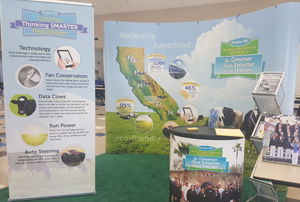
One in four students in the United States lives and learns in rural areas. Having lived and worked in the California’s Central Valley for over 10 years, I am aware of the unique challenges and opportunities these students face. While earning my bachelor’s degree at California Polytechnic State University—a school known for its engineering programs—many of my classmates were studying math, science, and technology, with plans to work in agriculture. As a high school teacher, I have had the privilege of watching my students participate in Future Farmers of America (FFA), an intracurricular organization for students interested in agriculture.
In the spring 2017 issue of New Horizons, Mark Moore reported on a $454,000 grant that provides precision agriculture technology to FFA members at North Newton and South Newton high schools in Indiana. Although the students still learn how to use traditional agricultural equipment (such as tractors and combines), they also learn how to operate drones to collect, analyze, and interpret real-time data from the field.
FFA programs provide instruction for students who want to learn about the science, business, and technology behind plant and animal production and natural resource systems. For example, students in one agricultural entrepreneurship class learned how to create, implement, and present a business plan. For their final project, they designed visual presentations that included the product, the mission statement, relevant statistics, and descriptions of the technologies involved. Projects like this help build critical literacy skills that can be applied to any subject.
2016 Honorary American FFA Degree recipient Julie Beechinor once said to me, “Many people still think agricultural is just about cows, sows, and plows. They have no clue how much technology is involved in agriculture. My students are trained to be scientists, and we need them to be. Because without smart agriculture, no one can live.”
Having seen what her students do, I couldn’t agree more!
Kip Glazer is a native of Seoul, South Korea, and immigrated to the United States in 1993 as a college student. She holds California Single Subject Teaching Credentials in Social Studies, English, Health, Foundational Mathematics, and School Administration. In 2014, she was named the Kern County Teacher of the Year. She earned her doctorate of education in learning technologies at Pepperdine University in October 2015. She has presented and keynoted at many state and national conferences on game-based learning and educational technologies. She has also consulted for Center for Innovative Research in Cyberlearning and the Kennedy Center ArtsEdge Program. Her Purposeful Tech column looks at how classroom teachers can think critically about today's instructional technologies.